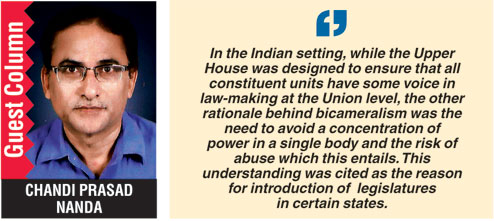LEGISLATIVE COUNCIL: The big debate Odisha government’s move to set up a legislative council has triggered a debate in the state. Questions are being raised about the utility of the council that would make Odisha one of the few states to have a bicameral legislature. While there is a concern over the kind of financial burden the move would entail, the motives of the government are being questioned. The Telegraph presents the voices of eminent personalities on the vexed issue

Odisha government is planning to constitute a state legislative council by making use of the powers conferred on it by Article 179 of the Indian Constitution. Critics have pointed it as yet another tactic by the Naveen Patnaik government to divert attention from the real policy issues.
Much ink has been spilt on this, but here we will try to explain the very rationale behind having bicameral legislatures in the states and its supposed benefits. The core rationale for having two chambers in a national legislature broadly flows from the need for checks and balances in a republican government, an idea that can be traced to an 18th century US constitutional debate.
At the same time, nations with large territories and heterogeneous constituents prefer bicameralism to ensure adequate representation of diverse interests at the federal level. The justification for bicameralism was rooted in the idea of Senate in the American context serving as a check on the potential excesses and omissions of the directly elected House of Representatives.
This translates into the Upper House in India acting as an auxiliary precaution against abuse by majority factions, while also serving as a forum for calm and informed deliberation in addition to its permanent character as a measure of stability.
The overarching theory behind the existence of such system is to safeguard the interests of the smaller territorial jurisdictions while at the same time ensuring adequate representation of the larger territorial jurisdictions, so that the will of the representatives of a minority of the electorate does not prevail over that of those who represented the majority.
In the Indian setting, while the Upper House was designed to ensure that all constituent units have some voice in law-making at the Union level, the other rationale behind bicameralism was the need to avoid a concentration of power in a single body and the risk of abuse which this entails. This understanding was cited as the reason for introduction of bicameral legislatures in certain states.
Dividing power between two legislative chambers of broadly equal status was construed as a safeguard against a single chamber taking extreme or excessive measures that may lack broad community support.
Given the fact that the Lower House embodies the will of the people and holds the executive accountable, the Upper House may be viewed as an obsolete relic, which is simply being continued as a 'halfway house' for the politicians. In support of this claim, it is often emphasised that many politicians who lack the ability or motivation to contest direct elections (including those who are considered to be past their prime in public life) are accommodated as Upper House members.
However, such critique should not deflect attention from the core justifications for bicameralism, namely that of providing a forum for second thought and ensuring that the diverse interests of the constituent units have a voice at the federal level.
The argument against the continuance of the Upper House also points to the increasingly fractured nature of Indian politics that can be identified with the emergence of several identity-based and regional political parties over the last few decades.
It is argued that since the incumbent political coalition that gets to form the cabinet will usually consist of a motley group of individuals representing all shades of the community at large (often with mutually conflicting postures and agendas), the same serves as enough of a restraint on potentially harmful majoritarian tendencies and hence there is no need for an additional check in the form of a second legislative chamber.
The reasoning is that an inherently unstable political coalition slows down decision-making and weakens the credibility of the executive in the eyes of the electorate, apart from being a burden on the state exchequer.
In this view, by retaining another barrier in the legislative process (since the incumbent coalition may not have the requisite majority in the second chamber), bicameralism only compounds the problems of a weak government. This is apparently a deeply flawed argument.
Even in the case of a consolidated incumbent government, there are bound to be internal tensions and contradictions within the ruling party.
Another objection against bicameralism, which certainly merits some consideration, is that the need for stability in a government is being met by a vast and sprawling administrative apparatus that ensures a certain modicum of continuity
Moreover, the peaceful regime-changes through elections can hardly be described as causes of instability. This leads to the suggestion that the second legislative chamber has outlived its utility as a contributor to stability.
While this is a well-constructed objection, one cannot ignore the 18th century American political theorist, James Madison's view that 'such an institution may sometimes be necessary, as a defence to the people against their own temporary errors and delusions.'
Given this backdrop, though the recent move for establishing bicameral legislature in Odisha can be construed as yet another political masterstroke, it still makes sense to see it as a very prudent move within the realms of constitutional practicality.
(The author is a history professor at Ravenshaw University)











